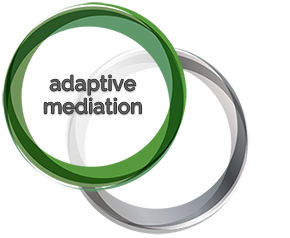
Adaptive Mediation
Assisting parties to identify options and negotiate an agreement to resolve disputes.
FREQUENTLY ASKED QUESTIONS
Click on the headings below for further information.
Got more questions? Email us at: info@adaptivemediation.com.au or make a booking for a Free Mediation Assessment.
What is the role of a Mediator?
Mediators are trained to create an environment that encourages open negotiation in a non-judgmental and confidential setting. This assists parties in dispute to more clearly define the relevant issues and work together to generate options for acceptable outcomes.
They do not provide advice and have no vested interest in the outcome.
Parties must be prepared to engage one another in open discussion, and understand that compromise is an inevitable part of any negotiation.
How long does mediation take?
Mediation sessions can take anywhere from half a day to several days, depending on the nature and complexity of the dispute. There is no such things as a typical mediation. Every mediation involves different people, issues, interests and needs, which brings many variables into play towards any outcome.
What are the advantages and disadvantages of mediation over other forms of dispute resolution?
The advantages revolve greatly around cost, time, flexibility and informality. Within these are the benefits of being free to express concerns without the constraints of court rules and processes, quicker finality and being actively involved in the decision making.
What is the process?
The Facilitative Model involves the following steps:
- Initial meeting or phone call with each party to briefly discuss the matter and obtain a summary or background to the dispute, and to determine whether mediation is appropriate in the circumstances.
- Introduction and Mediator’s opening statement
- Party statements – brief summary of concerns and issues
- Mediator identifies common ground and agenda
- Exploration – of underlying concerns, interests and needs, leading towards options and obstacles
- Private session – confidential with each party
- Negotiation – refine options into possible solutions
- Agreement
How much does mediation cost?
Fees are set at half day or full day rates, and hourly rates apply thereafter. There is an additional fee for the venue. All costs are to be shared equally by the parties and paid in advance of the mediation, based on our assessment of time required. Any additional fees will be billed after the mediation.
The average total cost of a mediation session is around $1500 per party which covers the pre-mediation meeting or discussion (usually around ½ to 1 hour), 3-4 hours of joint mediation and includes telephone consultations, planning, processing and documents including correspondence with you and any agreement.
There will be no clock watching. Where mediation runs overtime by 30 minutes or less you will not be charged.
You will receive an agreement to mediate which sets out full details of our fees and conditions well in advance of the mediation date. If you have questions, please do not hesitate to contact us to discuss.
What do I need to do before mediation?
We will send you a comprehensive list of information on how to prepare, specifically tailored to your conflict.
Generally, we need some details about you, the nature of your dispute, and a proposal for settlement. This way we have a better idea of what needs to be addressed, and how we can best assist you to reach agreement.
What if I am away or unable to attend in person for another reason?
This is not a big problem. We can arrange an online mediation. All you need is access to a reliable internet connection and a quiet room available at the time arranged.
Can I bring a support person?
This is a common request and can be accommodated in most circumstances. Please let us know well in advance of your mediation if this is required.
What if I have concerns about my safety?
This can occur from time to time. Provided both parties are prepared to have discussions, we can conduct the mediation from separate rooms and ensure you have the appropriate level of support prior to and during the process.
What happens when agreement is reached?
Congratulations on a successful mediation. You found a solution to your problem.
We will happily prepare a written document for both parties to sign, retain and use in any further way required, within 24-48 hours.
What happens if agreement is NOT reached?
Firstly, don’t be alarmed. Sometimes, a further session is necessary to nut out the details or have a fresh look at the issues.
We will do whatever we can to assist you to find peace of mind or refer you to an appropriate legal professional for other options.